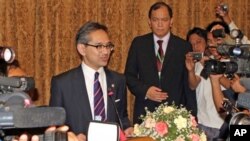Next week (November 14-19), leaders from 18 nations will gather on the Indonesian island of Bali for the sixth annual East Asia summit. The regional economic and security forum has steadily gained in importance in recent years and this year for the first time includes the leaders of the United States, Russia and China. The host nation Indonesia has raised the profile of the summit through its consensus-building work as chair of the Association of Southeast Asian Nations.
Temple mediation
When violent clashes between Thailand and Cambodia erupted in February, about disputed border claims near a historic Hindu-Khmer temple, Indonesian Foreign Minister Marty Natalegawa used his position as chairman of the Association of Southeast Asian Nations to act as a mediator.
During the months of shuttle diplomacy that followed, Natalegawa defended ASEAN's consensus-building approach while also acknowledging that the absence of any threat of political or economic sanctions makes his job more difficult.
"Diplomacy, it's not only about pressure and sanctions but also about encouragement. We'll see. The jury is still out. Come back to me in a little bit and see where we are," he said.
Natalegawa managed to get the two member states to agree in principle to a cease-fire agreement, but has been unable to actually implement the plan which calls for stationing Indonesian peacekeepers in the conflict zone.
Such diplomacy has made the ASEAN forum, and its East Asia summit, increasingly important for a region with about half of the world’s population and many of its fastest growing economies. U.S. officials routinely call the Asia-Pacific region one of the most dynamic and significant for American interests in the coming decades.
South China sea diplomacy
At the last ASEAN regional security summit, in July, Natalegawa hailed an agreement between China and ASEAN to resolve disputed claims in the oil-rich South China sea, even though the agreement only called for both sides to develop a process to eventually reach an agreement.
And, on the sidelines, officials from North and South Korea held informal talks, sparking hope for the eventual resumption of the six-party talks on North Korea’s nuclear programs.
Dewi Fortuna Anwar, Indonesia's deputy secretary to the vice president for political affairs says, although the ASEAN summits rarely produce ground breaking agreements, they play an important role in maintaining regional peace and stability.
"The most you can do is to try to diffuse tension and hopefully also to develop a mechanism for creating linkages between the parties so that the parties will see it is in their interest to cooperate, rather to carry out the rather adversarial relationships," said Anwar.
Burma issue
Also on the East Asia summit's agenda will likely be Burma's bid to take the annual chairmanship role of ASEAN in 2014. ASEAN has expressed conditional support as a incentive to further democratic progress made by recent elections and the release of pro-democracy leader Aung San Suu Kyi and some other political prisoners. Some human rights groups argue that ASEAN should take a tougher approach and first pressure Burma to live up to the organization's own democracy and human rights principles.
Anwar says supporting Burma or Myanmar's bid is risky for ASEAN's credibility as it moves to become an integrated regional organization in 2015 that establishes principles of democracy and the rule of law.
"If significant reforms are not made or if there are some setbacks in the reform then there is always the possibility that Myanmar's chairmanship of ASEAN, just one year before the ASEAN community is supposed to take place could spell real disaster, real public relations disaster for ASEAN," said Anwar.
But she says, especially in these times of regional economic growth, the "ASEAN way" of focusing on mutual interests, offering encouragement and building consensus over time is the most effective way to ensure peace and stability.





